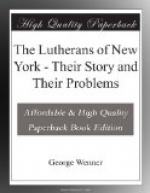He must have been a pious man and a winning personality. The entries in the book recording baptisms and other ministerial acts abound in accompanying prayers for the spiritual welfare of those to whom he had ministered.
For twenty years he served the churches of New York and the Hudson Valley. When and where he died we know not. Early in 1723 he was in New York and in Hackensack. In September of the same year there is a record of a baptism at Phillipsburg (near Yonkers). And then no more. “He was not, for God took him.”
Falckner’s successor, Berkenmeyer, a native of Lueneburg, arrived in 1725. He brought with him books for a church library and also funds for a new building, contributed by friends in Germany, Denmark, and London. The “old cattle shed” on the southwest corner of Broadway and Rector Street was torn down and a stone building erected which was dedicated in 1729 and named Trinity church.
The parish which Berkenmeyer inherited from Falckner, extending from New York to Albany, and including many Dutch and German settlements on both sides of the river, proved to be a larger field than he could cultivate. He therefore sent to Germany for another minister, and resigning at New York, took charge of the northern and more promising part of the field, making his home at Loonenburg (Athens), on the Hudson. For nineteen years he labored in this field. He died in 1751.
Berkenmeyer was a scholarly man, a faithful minister, and an impressive personality. He belonged to a different school from that of his great contemporary, Muehlenberg, and the rest of the Halle missionaries, and his correspondence with them frequently savored of theological controversy.
His successor in New York was Knoll, a native of Holstein, who spent eighteen years of faithful work in Trinity church under trying circumstances. He had to preach in Dutch to a congregation that had become prevailingly German. There was a growing dissatisfaction among the people. During the first half of the century Dutch influence gradually declined and German grew stronger. The ministers were all of them German, although they preached chiefly in Dutch, with occasional ministrations in German. At last the Germans, feeling the need of ampler service in their own language, took advantage in 1750 of the presence of a peripatetic preacher and instituted the first “split” in the Lutheran church of this city by organizing Christ Church. Knoll resigned soon after and removed to Loonenburg, where he again became the successor of Berkenmeyer.
[illustration: “Henry Melchior Muehlenberg (Otto Schweizer’s Heroic Stone Figure)”]
In the Eighteenth Century 1751-1800
The resignation of Knoll and the difficulties of the mother congregation were the occasion of calling to New York the most distinguished minister the American Church has ever had.




